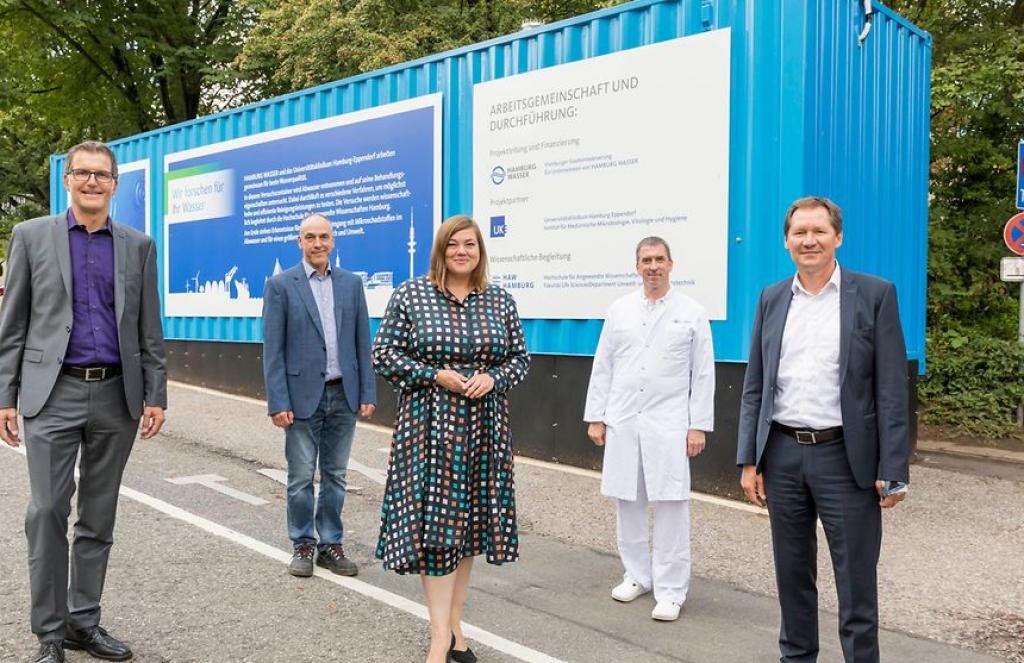Thessaloniki gets ready for its metro launch in November
The underground rapid transit lines have been under construction for almost two decades due to various project delays
 TheMayor.EU logo
TheMayor.EU logo 
(L-R): HAMBURG WASSER Managing Director Ingo Hannemann, Project Manager Dr. Thomas Werner, Science Senator Katharina Fegebank, Source: Axel Kirchhof via University Medical Center Hamburg-Eppendorf
If left unchecked, residues from hormones and painkillers can increase by 70% in the next 20 years
Last week, authorities in Hamburg announced they will start a new project to create a filtration system to handle leftover chemicals from the use of medication. Many of the ingredients in both over-the-counter and prescription medication end up as harmful and toxic residues in the city’s wastewater and end up polluting local rivers and lakes.
Additionally, the city has pointed out that the current water filtration systems are effective at cleaning a lot of the pollutants in wastewater but they are not a magic bullet. At the same time, medical drug use is only set to increase in the coming years, due to the high life expectancy in the city, which will, in turn, increase drug residue concentration in the surrounding bodies of water.
There are more than 100,000 approved medical products in Germany and around 35,000 of them are sold over the counter. Many of them have ingredients that are not biodegradable and once they pass through the body are classified as toxic and hazardous to the environment.
These include painkillers like diclofenac, antihypertensive medication and products with hormones. They enter the environment through wastewater, as sewage treatment plants cannot completely remove all of them from the water.
This is why city authorities and HAMBURG WASSER (Hamburg Water) set up two testing labs near University Medical Center Hamburg-Eppendorf (UKE), where scientists will try and find new ways to filter water.
The containers are placed near the Medical Centre because there the concentration of drug residues will be much higher, due to the increased use of medication and lack of any diluting clean water.
According to a statement by Ingo Hannemann, HAMBURG WASSER's Managing Director, there is already an excess of medical-based micropollutants in the city’s water and it is only going to get worse. He pointed out that due to the growing life expectancy and Germany’s ageing society, medication use is estimated to increase up to 70% in the next 20 years.

The underground rapid transit lines have been under construction for almost two decades due to various project delays

Now you can get your wine in Talence by paying directly in Bitcoin

That’s because the state has to spend money on updating the railway infrastructure rather than subsidizing the cost of the popular pass

Rethinking renewable energy sources for the urban landscape

The examples, compiled by Beyond Fossil Fuels, can inform and inspire communities and entrepreneurs that still feel trepidation at the prospect of energy transition

Now you can get your wine in Talence by paying directly in Bitcoin

The 10th European Conference on Sustainable Cities and Towns (ESCT) sets the stage for stronger cooperation between the EU, national and local level to fast track Europe's transition to climate neutrality.

At least, that’s the promise made by the mayor of Paris, Anne Hidalgo

The underground rapid transit lines have been under construction for almost two decades due to various project delays

At least, that’s the promise made by the mayor of Paris, Anne Hidalgo

Hostal de Pinós is located in the geographical centre of the autonomous region

Despite its church-y name, the district has long been known as the hangout spot for the artsy crowds

Urban dwellers across the EU are having a say in making their surroundings friendlier to people and the environment.

Forests in the EU can help green the European construction industry and bolster a continent-wide push for architectural improvements.

Apply by 10 November and do your part for the transformation of European public spaces

An interview with the Mayor of a Polish city that seeks to reinvent itself

An interview with the newly elected ICLEI President and Mayor of Malmö

A conversation with the Mayor of Lisbon about the spirit and dimensions of innovation present in the Portuguese capital














